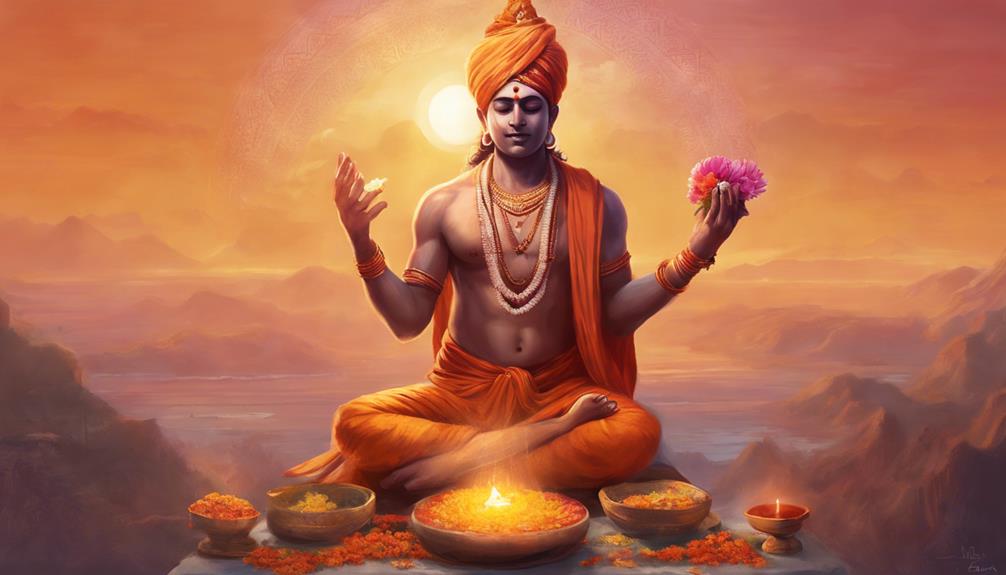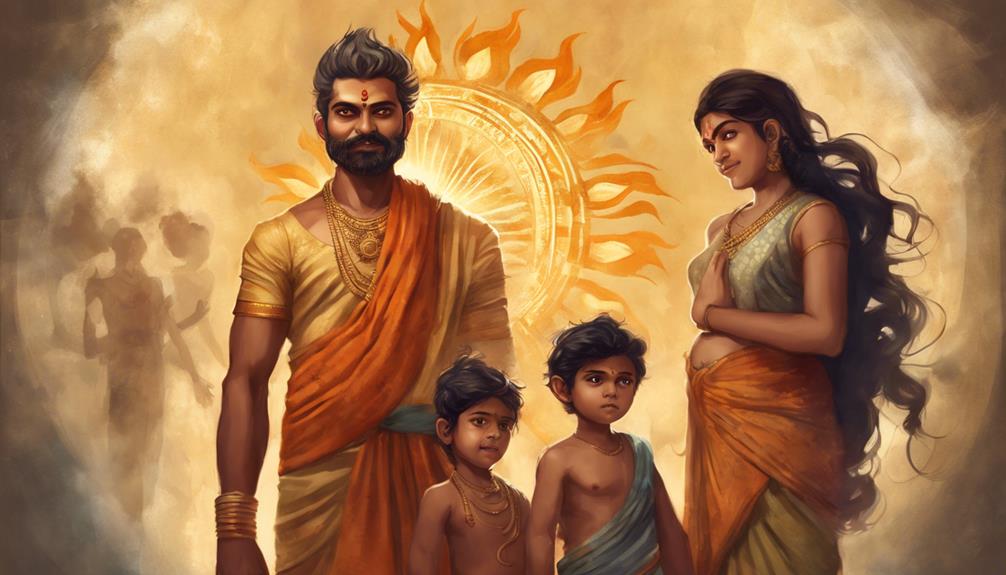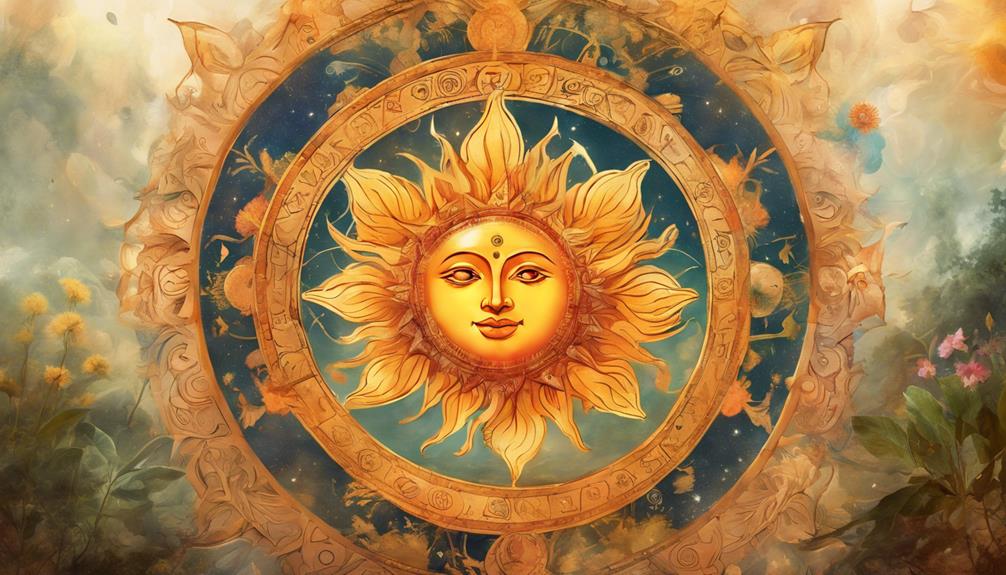In Hinduism, the Sun God (Surya) holds a significant position as a solar deity embodying light, warmth, and life-sustaining energy. Surya is worshipped for sustaining life, maintaining cosmic order, and symbolizing vitality and nourishment for all living beings. His radiant light signifies illumination, clarity, strength, and enlightenment, while his life-sustaining energy represents vitality, strength, and sustenance for creation and renewal. Discover more about Surya's origins, symbolism, family connections, rituals, festivals, astrology, and spiritual teachings to deepen your understanding of his profound role in Hindu mythology.
Table of Contents
Key Takeaways
- Surya symbolizes light, warmth, and life-giving energy in Hinduism.
- Morning prayers and rituals express gratitude for the sun's life-sustaining properties.
- Surya's family connections link to divine lineage, bridging life and death domains.
- Festivals like Chhath Puja celebrate Surya as the celestial source of light and energy.
- Surya influences astrology, Ayurveda, and spiritual teachings, representing vitality, leadership, and inner strength.
Origins of Surya in Hindu Mythology
In Hindu mythology, the origins of Surya, the Sun God, can be traced back to the Vedic texts where he's depicted as a prominent solar deity associated with light, warmth, and life-giving energy. As a mythological figure, Surya holds a significant place in Hindu cosmology and religious beliefs. The Vedic hymns portray Surya as a symbol of vitality and a source of nourishment for all living beings on Earth. His mythological origins are deeply rooted in the ancient scriptures, where he's revered for his role in sustaining life and upholding cosmic order.
Surya's mythological narrative often intertwines with other deities and epic tales, showcasing his importance in the pantheon of Hindu gods. The stories surrounding Surya highlight his power to illuminate the world and bring clarity to both the physical and spiritual domains. His depiction as a radiant deity symbolizes enlightenment, truth, and the cyclical nature of life. Through his mythological origins, Surya emerges as a celestial being embodying the essence of light and divine energy in Hindu cosmology.
Symbolism of Surya in Hinduism
In Hinduism, the symbolism of Surya encompasses various facets, with one prominent aspect being Surya's radiant light that symbolizes illumination and clarity.
Additionally, Surya's life-giving energy represents vitality, strength, and the source of all life on Earth.
Understanding these symbolic representations of Surya is important in comprehending the significant role the Sun God plays in Hindu religious beliefs and practices.
Suryas Radiant Light
Shining with brilliance and warmth, Surya's radiant light represents strength and energy in Hinduism. As a solar deity, Surya holds a significant place in Hindu beliefs, embodying the essence of the Sun's life-giving properties.
Sun worship, known as 'Surya Namaskar' in Hindu traditions, is a practice that venerates Surya's life-sustaining energy. The symbolism of Surya's radiant light extends beyond its physical manifestation, symbolizing enlightenment, knowledge, and awareness.
In Hindu scripture, Surya is often depicted driving a chariot across the sky, spreading light and dispelling darkness. The concept of Surya's radiant light serves as a metaphor for the illumination of truth and the dispelling of ignorance, guiding individuals towards spiritual awakening and enlightenment.
Suryas Life-Giving Energy
Surya, revered in Hinduism for his life-giving energy, symbolizes the essential force that sustains all living beings and drives the cycles of creation and renewal. The sun's life-giving energy is central to the concept of Surya, representing the vitality and warmth necessary for growth and sustenance.
In Hindu practices, Solar meditation harnesses this energy for spiritual enlightenment and rejuvenation, while energy healing utilizes the sun's power to restore balance and well-being. Sun worship, a common practice in Hindu rituals, acknowledges the sun as a manifestation of the life force that permeates the universe.
Understanding Surya's life-giving energy is fundamental to appreciating the interconnectedness of all living things and the cyclical nature of existence.
Suryas Importance in Daily Rituals

When it comes to Hindu daily rituals, the importance of Surya, the Sun God, can't be overstated. From the morning prayers dedicated to Surya to the practice of Surya Namaskar, a series of yoga postures saluting the sun, the reverence for Surya is deeply embedded in daily routines.
Additionally, the Surya Aarti ceremony, where devotees offer prayers and light incense to Surya, signifies the spiritual connection with the Sun God throughout the day.
Morning Prayers to Surya
In Hindu daily rituals, the morning prayers dedicated to Surya hold significant importance as they symbolize the beginning of a new day and the awakening of cosmic energy. These prayers are often performed during sunrise meditation, emphasizing the connection between the worshippers and the divine energy represented by the Sun God.
The act of solar worship at dawn is believed to bring blessings, vitality, and enlightenment to the devotee. Morning rituals directed towards Surya are seen as a way to express gratitude for the light, warmth, and life-giving properties of the sun. By engaging in these practices, individuals seek to align themselves with the powerful forces of nature and invoke the positive energy associated with Surya.
Surya Namaskar Practice
Engaging in the Surya Namaskar practice forms an integral part of daily rituals for many Hindus, embodying a profound connection to the cosmic energies represented by the Sun. This practice involves a sequence of twelve dynamic yoga postures that are performed in a flowing manner, combining physical exercise with mindfulness and spiritual devotion.
The Surya Namaskar not only offers physical benefits like increased flexibility, strength, and improved circulation but also enhances the practitioner's spiritual connection to Surya, the Sun God. Through the synchronization of breath and movement, this practice promotes mind-body alignment, fostering a sense of harmony and balance within the individual.
Additionally, the cultural significance of the Surya Namaskar lies in its role as a daily ritual that honors the divine energy of the Sun.
Surya Aarti Ceremony
The Surya Aarti Ceremony, a significant component of daily Hindu rituals, serves as a reverent expression of devotion to Surya, the Sun God, further solidifying the connection between practitioners and the divine energy embodied by the Sun.
This ritual holds immense significance in Surya worship rituals as it involves offering light to the Sun deity through the waving of lamps accompanied by hymns and prayers. The Surya Aarti signifies the awakening of the divine consciousness within individuals, symbolizing the dispelling of darkness and the arrival of light, both literally and metaphorically.
Suryas Family Connections in Hinduism

Emanating from the radiant core of Hindu mythology, the intricate family connections of Surya, the Sun God, permeate the divine tapestry with profound significance and interwoven relationships. Surya's divine lineage traces back to Kashyapa, one of the seven ancient sages, and his wife Aditi, the mother of all gods. This lineage positions Surya as a prominent figure in Hindu cosmology, symbolizing light, energy, and life itself.
Within the vast network of Hindu deities, Surya's familial relationships are equally compelling. He's often depicted as the father of Karna, the great warrior from the Mahabharata epic, through his union with Kunti. Additionally, Surya is connected to Yama, the god of death, and Yami, the goddess of the Yamuna River, as their father. These relationships underline Surya's multifaceted role in Hinduism, bridging the domains of life and death, light and darkness. By understanding Surya's family connections, one gains insight into the intricate tapestry of Hindu mythology and the interplay of divine forces shaping the universe.
Suryas Role in Hindu Festivals
Surya plays a significant role in various Hindu festivals, symbolizing the celestial source of light and energy that holds immense cultural and spiritual importance. Festive celebrations honoring Surya are widespread across India and are marked by elaborate rituals and worship practices. One such festival is Chhath Puja, a prominent celebration in Bihar where devotees offer prayers to the Sun God at sunrise and sunset, expressing gratitude for sustaining life on earth.
During Makar Sankranti, another popular festival, people take ritualistic dips in holy rivers and offer water to the Sun God as a symbolic gesture of purification and renewal.
Offerings such as water, flowers, fruits, and incense are commonly made to Surya during these festivals, symbolizing devotion and seeking blessings for prosperity and well-being. The ritual significance of these acts lies in their representation of gratitude towards Surya for providing light, warmth, and life-sustaining energy. Through these festive celebrations, Hindus not only honor Surya but also strengthen their spiritual connection to the divine source of light and vitality.
Suryas Influence on Astrology and Ayurveda

In the domain of astrology and Ayurveda, the influence of Surya is deeply intertwined with the understanding of cosmic energies and their impact on human life and well-being. Astrologically, Surya holds immense significance as it represents the soul, authority, leadership, and vitality. In Vedic astrology, the position of the Sun in an individual's birth chart is believed to influence their personality, ego, and overall life path. Surya's energy is associated with self-realization, willpower, and success, making it an important factor in astrological interpretations.
Moreover, in Ayurveda, the traditional system of medicine in Hinduism, Surya is revered for its healing properties. Surya is believed to govern the fire element in the body, responsible for digestion, metabolism, and vitality. Practices such as Surya Namaskar (Sun Salutation) aren't only a form of physical exercise but also a way to honor the Sun and absorb its healing energies. Ayurvedic texts suggest that exposure to the Sun can have therapeutic effects on various health conditions, promoting overall well-being and balance in the body. As a result, Surya's influence extends beyond the celestial domain, playing a significant role in astrology and Ayurveda for holistic wellness.
Suryas Spiritual Teachings and Mantras
With a rich tapestry of spiritual teachings and powerful mantras, the influence of Surya in Hinduism extends beyond mere celestial presence to guide individuals on a profound journey of self-discovery and enlightenment. Surya's spiritual teachings emphasize the importance of inner strength, truth, and righteousness. Through the teachings associated with Surya, individuals are encouraged to cultivate qualities such as courage, determination, and integrity in their spiritual and worldly pursuits.
One of the most significant aspects of Surya's spiritual teachings is the concept of unity and interconnectedness. Surya is often seen as a symbol of unity, representing the idea that all beings are interconnected and part of the same cosmic energy. By embracing this teaching, individuals can endeavor to overcome feelings of separation and ego, leading to a deeper sense of harmony with the universe.
Surya's healing mantras, such as the Gayatri Mantra dedicated to the Sun God, are believed to have powerful transformative effects on the practitioner. Chanting these mantras is thought to bring clarity of mind, physical energy, and spiritual growth. The repetition of Surya's mantras is considered a potent tool for purifying the mind and body, facilitating a deeper connection with the divine energy that Surya represents.
Frequently Asked Questions
How Does the Worship of Surya Differ in Different Regions of India?
In different regions of India, worship of Surya showcases regional variations and diverse cultural practices. These differences shape rituals, beliefs, and ceremonies surrounding the Sun God, reflecting the rich tapestry of India's religious traditions.
Are There Any Specific Rituals or Prayers Dedicated to Surya for Specific Purposes, Such as Health or Prosperity?
When seeking health or prosperity, devotees turn to specific rituals and prayers dedicated to Surya. Surya mantras and yantras are utilized in Surya pujas, where offerings like Surya arghya are made to invoke blessings for various purposes.
How Is Surya Perceived by Followers of Other Religions in India?
When followers of other religions in India perceive Surya, it showcases interfaith dialogue and religious tolerance. Cultural assimilation is evident as different belief systems interact, fostering understanding and respect for diverse spiritual practices in the country.
Are There Any Temples Dedicated Solely to Surya, and if So, Where Are They Located?
You can find temples solely dedicated to Surya in India, such as the Konark Sun Temple in Odisha and the Modhera Sun Temple in Gujarat. These sacred sites are where devotees engage in various ritual practices and offer prayers to the Sun God.
How Does the Concept of Surya Relate to Other Celestial Deities in Hinduism, Such as Chandra (The Moon) or Agni (Fire)?
In Hinduism, Surya's celestial relationships with Chandra and Agni highlight a intricate web of symbolic significance. Surya, the sun god, represents life, energy, and illumination, while Chandra and Agni embody different aspects of light and energy, forming a divine trinity.
Conclusion
To sum up, the Sun god Surya plays a significant role in Hinduism, representing light, energy, and crucial.
From his origins in ancient mythology to his presence in daily rituals, festivals, and spiritual teachings, Surya's influence is deeply ingrained in the beliefs and practices of Hindu followers.
With connections to astrology and Ayurveda, Surya serves as a symbol of divine power and guidance, guiding individuals on their spiritual journey towards enlightenment.